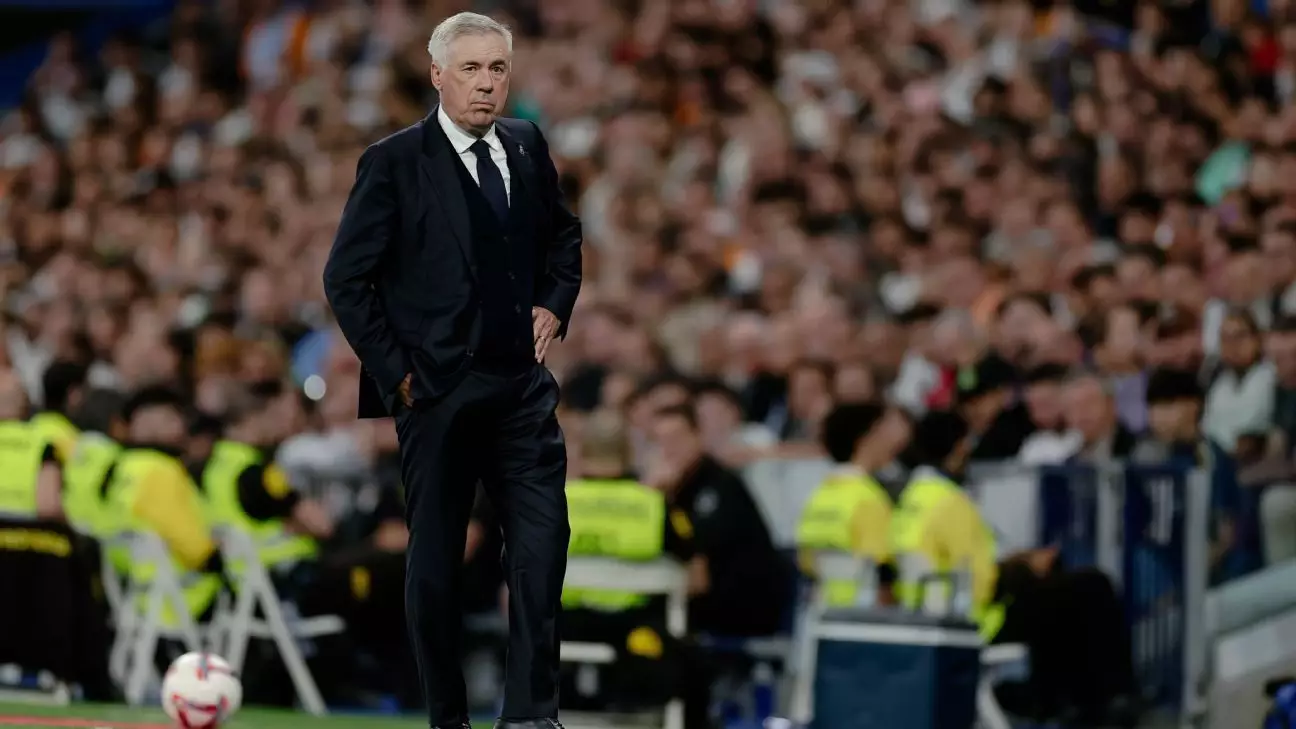The recent flash floods in Valencia, leading to a staggering loss of lives and significant destruction, underscore a crucial moment for Spain, not just as a nation but particularly for its cultural pillar—football. With at least 217 fatalities reported and thousands displaced, this natural disaster has raised fundamental questions regarding the intersection of sports and social responsibility. Real Madrid’s head coach, Carlo Ancelotti, articulated these sentiments when he suggested that all football activities in the country should cease in response to such a tragedy. His assertion reflects a broader ethical consideration that juxtaposes the joy and celebration inherent in sports against the backdrop of national suffering.
In normal circumstances, football serves as a source of respite for the masses, an escape that unites fans from varied backgrounds. However, Ancelotti’s comments, along with similar sentiments expressed by coaches across LaLiga, highlighted the stark reality that, when disaster strikes, such festivities can feel almost trivial. While the postponement of matches involving Valencia and Villarreal aligned with an expression of solidarity, the decision to carry on with the remaining fixtures seemed inconsistent and sparked fierce debate among players and coaching staff.
The reaction from various quarters in football illustrates a growing awareness and responsibility within the sports community. With respected figures like Diego Simeone of Atlético Madrid echoing the sentiment that continuing with matches under the circumstances was illogical, an essential conversation was ignited regarding the moral obligations of sporting bodies during crises. Ancelotti emphasized that “football is a party,” and when people are suffering, it is not the time for celebration. This position brings forth a resounding message about prioritizing human empathy over entertainment—a critical lesson often underappreciated within the commercialized realm of professional sports.
The juxtaposition of human tragedy against football matches being played in the same week not only raises ethical questions but also challenges cultural perceptions of what sports represent. As a society built around the love of football, Spaniards are now evaluating the weight of their ties to the sport against the suffering of their fellow citizens. This intersection of sport and public sentiment may signal a pivotal moment for the sport to reconsider how it approaches crises in the future.
Despite the overwhelming turmoil that came with the floods, players and coaches are bound by professional norms to prepare and participate in matches, albeit under difficult circumstances. Ancelotti’s acknowledgment of the emotional toll this week’s events had on his team illustrates the delicate balance athletes must maintain between their professional duties and the reality they face off the pitch.
Lucas Vázquez’s remarks, “Our opinion is zero, our strength is zero,” highlight the limitations imposed on players and coaches concerning decisions made by higher-ups. Their voices, though intertwined with the sentiments of the nation, seem muted in the grander scheme of organizational rules and governance within the sport. Yet this demonstrates a troubling aspect of professional athletics where the human element can be overshadowed by commercial and logistical considerations.
In the aftermath of such tragic events, one must ponder the lasting impact they could potentially have on the future of football within Spain. Will clubs, federations, and governing bodies take a more compassionate approach when similar situations arise? Could this moment serve as a catalyst for change, one that promotes greater alignment of sports with the values of community and empathy?
Real Madrid and other clubs now have a unique opportunity to lead by example—not only in the aftermath of the flooding but also in how they conduct their operations moving forward. Potential partnerships with humanitarian organizations, campaigns to raise awareness for disaster relief, and an overall commitment to social responsibility could redefine what it means to be a club in Spain. Such actions may resonate well beyond the pitch and into the hearts of the fans, showcasing a sport that is not only about competition and glory but also about solidarity and unity in times of crisis.
Ultimately, this tragic chapter in Valencia’s history not only demands reflection but also a commitment to ensuring that football, as a beloved part of Spanish culture, truly embodies the spirit of the community it serves.

